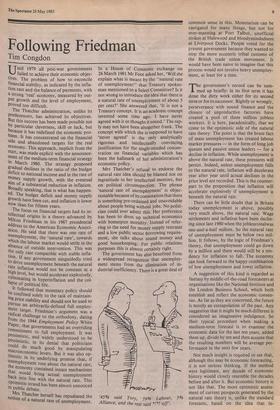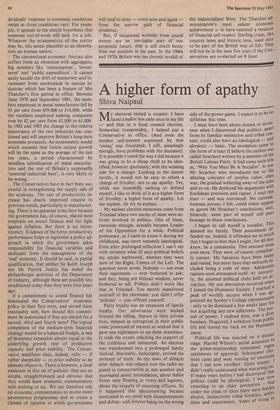Following Friedman
Tim Congdon
Until 1979 all post-war governments failed to achieve their economic objec- tives. The problem of how to -reconcile financial stability, as indicated by the infla- tion rate and the balance of payments, with a strong 'real' economy, measured by out- put growth and the level of employment, proved too difficult.
The Thatcher administration, unlike its predecessors, has achieved its objectives. But this success has been made possible not by particular cleverness, skill or luck, but because it has redefined the economic pro- blem. It has concentrated on the financial side and abandoned targets for the real economy. This approach, implicit from the start, was made explicit with the announce- ment of the medium-term financial strategy in March 1980. The strategy proposed gradual declines in the ratio of the budget deficit to national income and in the rate of money supply growth, with the eventual aim of a substantial reduction in inflation. Broadly speaking, that is what has happen- ed. The budget deficit and money supply growth have been cut, and inflation is lower now than for fifteen years.
The focus on financial targets had its in- tellectual origins in a theory advanced by Milton Friedman in his 1967 presidential address to the American Economic Associ- ation. He said that there was one rate of unemployment, the 'natural rate', towards which the labour market would settle in the absence of outside intervention. This was the only rate compatible with stable infla- tion. If any government misguidedly tried to drive unemployment beneath the natural rate inflation would not be constant at a high level, but would accelerate explosively, culminating in hyperinflation and the col- lapse of political life.
It followed that monetary policy should be confined solely to the task of maintain- ing price stability and should not be used to pursue an arbitrarily-defined full employ- ment target. Friedman's argument was a radical challenge to the orthodoxy, dating
from the 1944 Employment Policy White
Paper, that governments had an overriding commitment to full employment. It was Pessimistic, and widely understood to be pessimistic, in its denial that politicians could do much good by manipulating macroeconomic levers. But it was also op- timistic in its underlying premise that, if unemployment rose about the natural rate, the economy contained innate mechanisms that would bring actual unemployment back into line with the natural rate. This optimistic strand has been almost unnoticed in public debate. Mrs Thatcher herself has repudiated the notion of a natural rate of unemployment. In a House of Commons exchange on 26 March 1981 Mr Foot asked her, 'Will she explain what is meant by the "natural rate of unemployment" that Treasury spokes- man mentioned to a Select Committee? Is it not wrong to introduce the idea that there is a natural rate of unemployment of about 5 per cent?' She answered that, 'It is not a Treasury concept. It is an academic concept invented some time ago. I have never agreed with it or thought it sound.' The rep- ly may not have been altogether frank. The concept with which she is supposed to have 'never agreed' is the only analytically rigorous and intellectually convincing justification for the single-minded concen- tration on financial variables which has been the hallmark of her administration's economic policy.
Mrs Thatcher's refusal to endorse the natural rate idea should be blamed not on ingratitude to her intellectual mentors, but on political circumspection. The phrase 'natural rate of unemployment' is objec- tionable because of its connotation that there is something pre-ordained and unavoidable about people being without jobs. No politi- cian could ever admit this. Her preference has been to dress up technical economics with homespun morality. Instead of refer- ring to the need for money supply restraint and a low public sector borrowing require- ment, she talks about sound money and good housekeeping. For public relations purposes this is almost certainly right.
The government has also benefited from a widespread recognition that unemploy- ment stems from the elimination of in- dustrial inefficiency. There is a great deal of
'45% said Tory, 39% Labour, 3% Alliance, and the rest said *!•.! off'. common sense in this. Monetarism can be castigated for many things, but not for over-manning at Port Talbot, unofficial strikes at Halewood and bloodymindedness at Liverpool Docks. People voted for the present government because they wanted to stop the more eccentric tribal customs of the British trade union movement. It would have been naive to imagine that this process would not involve heavy unemploy- ment, at least for a time.
he government's record can be sum- med up briefly: in its first term it has done the dirty work either for its second term or for its successor. Rightly or wrongly, perseverance with sound finance and the closure of unproductive factories have created_ a pool of three million jobless workers. It is here, paradoxically, that we come to the optimistic side of the natural rate theory. The point is that the brute fact of mass unemployment has created labour market pressures — in the form of long job queues and passive union leaders — for a decline in inflation. While unemployment is above the natural rate, these pressures will persist. Indeed, unless unemployment falls to the natural rate, inflation will decelerate year after year until actual declines in the price level are recorded. This is the counter- part to the proposition that inflation will accelerate explosively if unemployment is beneath the natural rate.
There can be little doubt that in Britain today unemployment is above, possibly very much above, the natural rate. Wage settlements and inflation have been declin- ing since late 1980 when the joblesstotalwas one-and-a-half million. So the natural rate of unemployment must be below two mil- lion. It follows, by the logic of Friedman's theory, that unemployment could go down by a million and there would still be a ten- dency for inflation to fall. The economy can look forward to the happy combination of low unemployment and lower inflation.
A suggestion of this kind is regarded as fantasy by middle-of-the-road forecasters at organisations like the National Institute and the London Business School, which both establish and reflect the economic consen- sus. As far as they are concerned, the future is mostly an extrapolation of the past. Any suggestion that it might be much different is considered an imaginative indulgence. So their typical procedure when making a medium-term forecast is to examine the economic data for the last ten years, added them up, divide by ten and then assume that the resulting numbers will be average per- formance in the next few years.
Not much insight is required to see that, although this may be economic forecasting, it is not serious thinking. If the method were legitimate, any decade of economic history would closely resemble the decades before and after it. But economic history is not like that. The more optimistic assess- ment of current prospects generated by the natural rate theory is, unlike the standard forecasts, based on the idea that in- dividuals' response to economic conditions varies as those conditions vary. For exam- ple, it appeals to the simple hypothesis that someone out-of-work will look for a job. Whatever the econometrics of the matter may be, this seems plausible as an observa- tion on human nature.
The conventional economic forecast also suffers from an obsession with aggregates, big numbers like 'consumption', 'invest- ment' and 'public expenditure'. It cannot easily handle the shift of manpower and in- vestment from smokestack to sunrise in- dustries which has been a feature of Mrs Thatcher's first period in office. Between June 1978 and September 1981, the num- bers employed in metal manufacture fell by 31 per cent from 459,000 to 314,000, while the numbers employed making computers rose by 42 per cent from 43,000 to 61,000. In 1982 and 1983 the change in the relative importance of the two industries has con- tinued and will improve Britain's long-term economic prospects. An econometric model which assumes that future output growth will be the same as the average of the last ten years, a period characterised by mindless subsidisation of metal manufac- ture and the rest of Britain's supposedly `essential industrial base', is very likely to be wrong.
The Conservatives have in fact been suc- cessful in strengthening the supply side of the economy. The rate of productivity in- crease has clearly improved relative to previous trends, particularly in manufactur- ing. There is an apparent irony here because the government has, of course, placed most emphasis on sound finance and the fight against inflation. But there is no incon- sistency. Evidence of the better productivity performance helps to legitimise a policy ap- proach in which the government takes responsibility for financial variables and abdicates from the management of the `real' economy. It should be said, in partial qualification, that neither Sir Keith Joseph nor Mr Patrick Jenkin has ended the philanthropic activities of the Department of Industry, although these are possibly less misdirected today than they were four years ago.
If a commitment to sound finance has dominated the Conservatives' economic policy in their first term, and served them reasonably well, how should this commit- ment be maintained if they are elected for a second, third and fourth term? The logical completion of the medium-term financial strategy would be a balanced budget, a rate of monetary expansion always equal to the underlying growth rate of productive capacity and price stability. The Conser- vative manifesto does, indeed, refer — if rather sheepishly — to price stability as an ultimate objective. There is however, a fatal weakness in this set of policies: they are so simple, straightforward and obvious that they would leave economic commentators with nothing to say. We can therefore rely on economic commentators to invent more adventurous programmes and so create a climate of opinion in which governments will tend to stray — every now and again from the narrow path of financial prudence.
But, if occasional wobbles from sound money are an inevitable part of our economic future, that is still much better than our position in the past. In the 1960s and 1970s Britain was the chronic invalid of the industrialised West. The Thatcher ad- ministration's most salient economic achievement is to have restored a measure of financial self-respect. Sterling crises, like country lanes and historic inns, used once to be part of the British way of life. They will not be in the next five years if the Con- servatives are re-elected on 9 June.















































 Previous page
Previous page